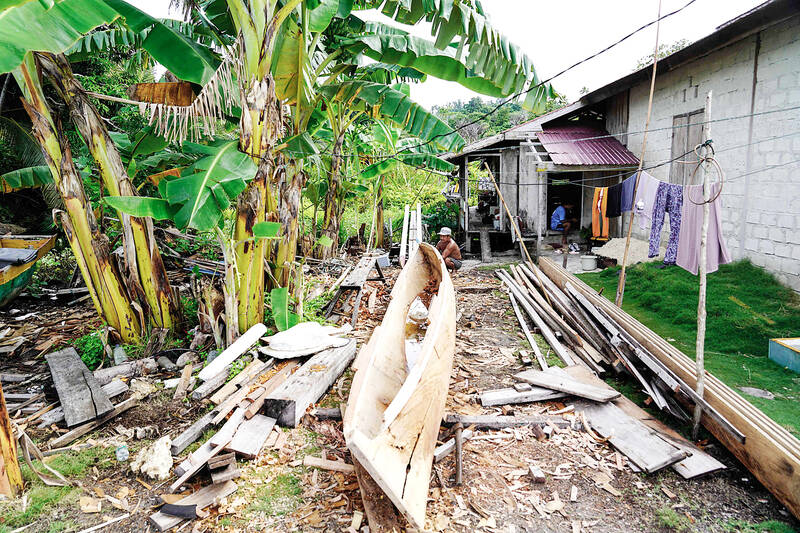Sofyan Sabi’s sea-dwelling community has fished beneath the waves off the Indonesian coast for centuries, but climate change and overfishing have forced him and many of his contemporaries on land to make a living.
The Bajau tribe of fishers led a nomadic life at sea for generations, spending days and nights on boats with thatched roofs in the waters between Indonesia, Malaysia and the Philippines.
Members of the tribe learn to dive from a young age and their bodies have adapted over time to allow them to fish underwater for longer periods, researchers say.

Photo: AFP
However, for the hundreds of Bajau living on the tiny boardwalk island village of Pulau Papan in Indonesia, their ancestors’ unique way of life has all but died out.
“We changed professions. We are fishermen who work at a farm. Farming gives better income because there are many crops I can plant,” Sofyan said, adding that he owns a nearby two-hectare plot to grow corn and bananas.
“Sometimes we earn nothing by going to sea. Sometimes there are fish, sometimes there aren’t any,” the 39-year-old said.
Trained to hold his breath between 10m and 15m deep since he was a child, Sofyan still scans the waters for sea cucumbers or an octopus that could earn him as much as 500,000 rupiah (US$31).
Researchers attribute the Bajau ability to dive deeper and longer to a possible genetic mutation that has given them larger spleens, allowing their blood to store more oxygen.
However, commercial overfishing and rising temperatures have made sea catches increasingly unpredictable, said Wengki Ariando, a researcher at Thailand’s Chulalongkorn University who has studied the Bajau.
“They are facing decreasing marine resources,” he said.
As temperatures rise, fish migration and mating patterns change, corals are bleached and the food chain changes.
More than half of Indonesia’s 11 fishery management areas are now listed as fully exploited.
The nation’s fish stocks fell from 12.5 million tonnes in 2017 to 12 million tonnes in 2022, Indonesian Ministry of Maritime Affairs and Fisheries data shows.
“The fish are decreasing because too many people are catching them,” said 52-year-old fisher Arfin, who goes by one name.
A dilapidated jetty takes visitors along turquoise waters onto Pulau Papan.
Davlin Ambotang, who lives on the island, says the Bajau first started to settle there three generations ago.
“They saw this island as suitable for building houses, so they settled there. No longer nomads, moving around,” he said.
However, life on land has its own challenges. Davlin’s brother runs a homestay banking on tourist visits. He complains that authorities direct visitors to sleep at government-built cottages instead of helping Bajau businesses flourish.
“There’s no additional income for the people. The government controls everything,” Sofyan said. “There are many arguments between them and the locals.”
The long stateless Bajau grew increasingly settled in villages such as Pulau Papan in search of government recognition.
“The Bajau changed their livelihood because to get accepted as a people in Indonesia they have to be settled,” said Wengki, adding that the drive to register them officially began in the 1990s under former Indonesian president Suharto.
Wooden boats sit at the edge of the island, while a main walkway cuts through it, splintering off into side jetties.
The village hosts a silver-domed mosque. On a makeshift court, women play a game of volleyball, while a group of men sit around smoking cigarettes.
“The young generation, they look like they are missing their identity,” Wengki said. “They are more like a land-based community.”
With Internet access available on land, the Bajau have set up groups on social media with thousands of followers, helping each other with their problems.
“There is no development, nothing. From the district government, there were donations, each family gets two to three bags of rice every month,” said Tirsa Adodoa, a housewife in her 20s whose husband is a fisher. “It’s not enough if we only rely on catching octopuses. If the octopus price drops like right now ... it’s not even enough for us to eat or buy things.”
But others yearn for the nomads to keep their seafaring ways — worrying future generations would be less like their boat-dwelling ancestors.
“Once they feel comfortable, it won’t be easy for them to go back to the sea,” said fisher Muslimin, 49, who goes by one name. “I wish they could work only as fishermen, because it’s fun. There are too many difficulties on the land.”

Archeologists in Peru on Thursday said they found the 5,000-year-old remains of a noblewoman at the sacred city of Caral, revealing the important role played by women in the oldest center of civilization in the Americas. “What has been discovered corresponds to a woman who apparently had elevated status, an elite woman,” archeologist David Palomino said. The mummy was found in Aspero, a sacred site within the city of Caral that was a garbage dump for more than 30 years until becoming an archeological site in the 1990s. Palomino said the carefully preserved remains, dating to 3,000BC, contained skin, part of the

TRUMP EFFECT: The win capped one of the most dramatic turnarounds in Canadian political history after the Conservatives had led the Liberals by more than 20 points Canadian Prime Minister Mark Carney yesterday pledged to win US President Donald Trump’s trade war after winning Canada’s election and leading his Liberal Party to another term in power. Following a campaign dominated by Trump’s tariffs and annexation threats, Carney promised to chart “a new path forward” in a world “fundamentally changed” by a US that is newly hostile to free trade. “We are over the shock of the American betrayal, but we should never forget the lessons,” said Carney, who led the central banks of Canada and the UK before entering politics earlier this year. “We will win this trade war and

‘BODIES EVERYWHERE’: The incident occurred at a Filipino festival celebrating an anti-colonial leader, with the driver described as a ‘lone suspect’ known to police Canadian police arrested a man on Saturday after a car plowed into a street party in the western Canadian city of Vancouver, killing a number of people. Authorities said the incident happened shortly after 8pm in Vancouver’s Sunset on Fraser neighborhood as members of the Filipino community gathered to celebrate Lapu Lapu Day. The festival, which commemorates a Filipino anti-colonial leader from the 16th century, falls this year on the weekend before Canada’s election. A 30-year-old local man was arrested at the scene, Vancouver police wrote on X. The driver was a “lone suspect” known to police, a police spokesperson told journalists at the

North Korean leader Kim Jong-un has unveiled a new naval destroyer, claiming it as a significant advancement toward his goal of expanding the operational range and preemptive strike capabilities of his nuclear-armed military, state media said yesterday. North Korea’s state-run Korean Central News Agency (KCNA) said Kim attended the launching ceremony for the 5,000-tonne warship on Friday at the western port of Nampo. Kim framed the arms buildup as a response to perceived threats from the US and its allies in Asia, who have been expanding joint military exercises amid rising tensions over the North’s nuclear program. He added that the acquisition